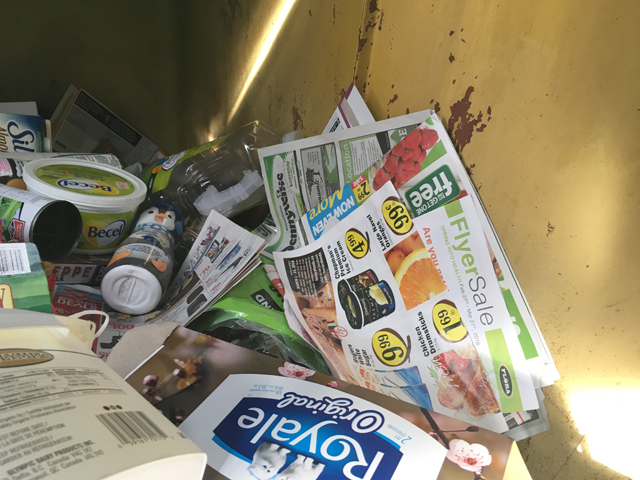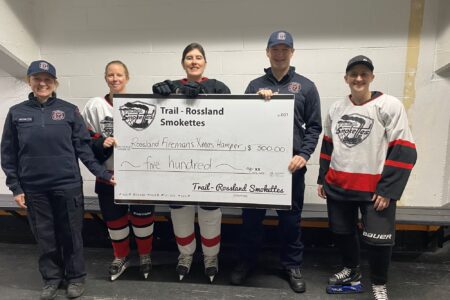RDCK takes action against print media on lack of compliance with producer-oriented recycling costs
The newspaper industry’s lack of compliance with the directives set out by Multi-Material B.C. to atone for its waste production has prompted the regional district to take action.
In its last meeting the Regional District of Central Kootenay board of directors passed a resolution which will be sent to the Association of Kootenay-Boundary Local Governments (AKBLG) asking the Union of B.C. Municipalities (UBCM) to request the Ministry of Environment to enforce the recycling regulation of the Environment Management Act to compel the participation of newspaper producers in the MMBC program.
RDCK chair Karen Hamling (Nakusp) said the RDCK was hoping that the support of the AKBLG and, ultimately, the UBCM would help the regional district “in our endeavours to bring MMBC to the areas that currently do not have a contract with MMBC.
“(This) has created hardship in the fact that our residents are having to pay the recycling fee when they purchase the product, and also to have the product removed,” she said. “The areas covered by MMBC do not generally have to pay for recycling.”
The Ministry of Environment has stated that the Multi Material B.C. (MMBC) recycling stewardship program is underfunded primarily due to the lack of participation in the program by producers of newspaper, read the RDCK resolution.
As a result of the underfunded program, a number of local governments have been denied access into MMBC, said Hamling.
The provincially-mandated recycling program was predicted to save B.C. regional districts and municipalities millions of dollars but is instead costing the regional district and its member communities over $425,000.
The MMBC program was brought in to put the onus and the cost on the commercial producers of environmental waste to dispose of it, therefore saving local governments the cost of recycling, a service it had to tax to provide.
However, managing director of the MMBC, Allen Langdon, said in a meeting in October with the RDCK board of directors that newspapers are not meeting their obligations under the B.C. Recycling Regulation and are therefore not paying their fair share of the program’s costs.
The Ministry of Environment is trying to obtain compliance from these producers, Langdon noted, but currently there is no authority under the regulation to compel producers to comply.
That non-compliance is costing the regional district and its taxpayers. RDCK staff prepared a recent report on costs they believed should have been picked up through service by MMBC. The amount for a portion of fiscal year 2014 which the RDCK had expected MMBC to cover was $425,000.
Several board representatives met with minister of Environment Mary Polak in 2014 at the UBCM annual meetings, and again in late 2015 to request that compliance be strongly pursued by the ministry, Hamling explained.
“It would appear that most of the big producers are on board with the exception of the newspaper industry and a several smaller manufacturers,” she said.
Provincial product packaging and paper producers range from multi-national corporations to small newspapers.
“Other than the newspapers I do not believe very many businesses in the Kootenays produce packaging and paper, and none of the newspapers are participating as far as I am aware,” said Area A (East Shore) director Garry Jackman.
A move that is costing people in the RDCK and cities like Nelson more money.
Jackman said asking the head of the MMBC to speak, as well as approaching the province, are two steps towards obtaining local compliance.
“Compliance and enforcement is within the realm of the stewardship consortium (MMBC) and the province,” he said.
Hamling agreed.
“We can keep lobbying the government to work with MMBC to ensure that we can become part of the MMBC network,” she said. “We can’t, as a regional district, compel producers to comply. This is up to the government.”
Although Hamling said the regional district is looking at its options at this point to work with the ministry, the regional district is continuing to offer the recycling program as it has in the past.
Despite the contention with the print industry, the regional district and all levels of government are required to advertise in local newspapers, depending on the circumstance.
In fact, in the same agenda that the resolution against the newspaper industry was passed, the regional district board approved a $2,110.23 community development grant to a local newspaper, the money funding an Area E advertisement for the Area E economic development service.
Hamling said the development grant for Area E was for tourism development.
“The majority of the funds that we spend on advertising is legislated by the province and we have no choice but to advertise in newspapers,” she said.
“I don’t think taking a stand against our smaller, local paper industries is the place to take a stand. It is the bigger newspaper industry that is the issue.”
Langdon said the program’s expansion depends on additional businesses joining MMBC. MMBC is a not-for-profit agency formed under the B.C. Society Act to develop a stewardship plan to satisfy the requirements of the Recycling Regulation for packaging and printed paper (PPP) producers.
Businesses can appoint MMBC as their agent to discharge their obligations under the Recycling Regulation. Since May 2014, approximately 1,000 businesses have joined the program.
MMBC services 96 per cent of B.C. households through its depot network. In the RDCK, the following communities receive curbside service through MMBC: Nelson, Castlegar, Kalso and Nakusp.
























